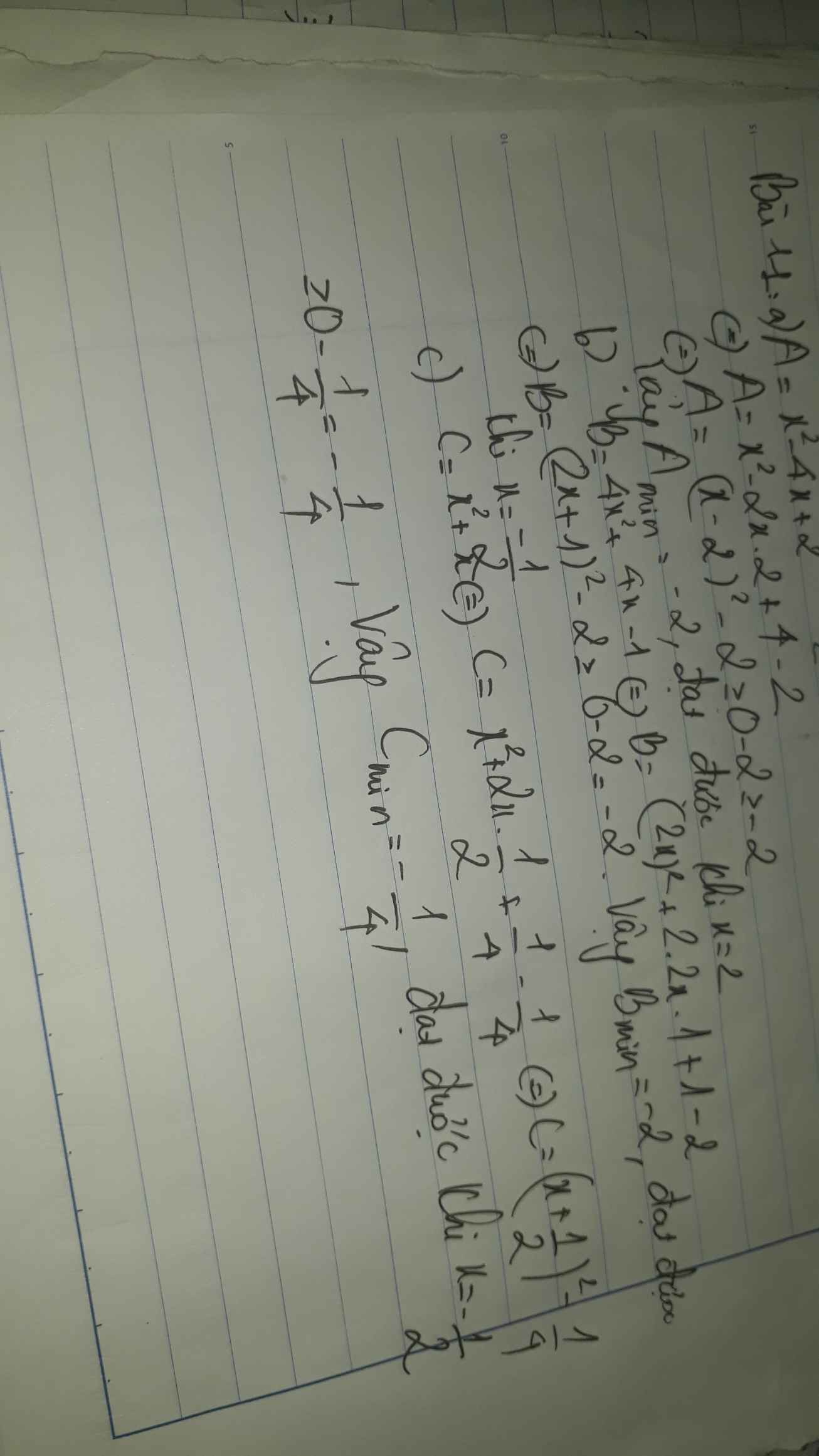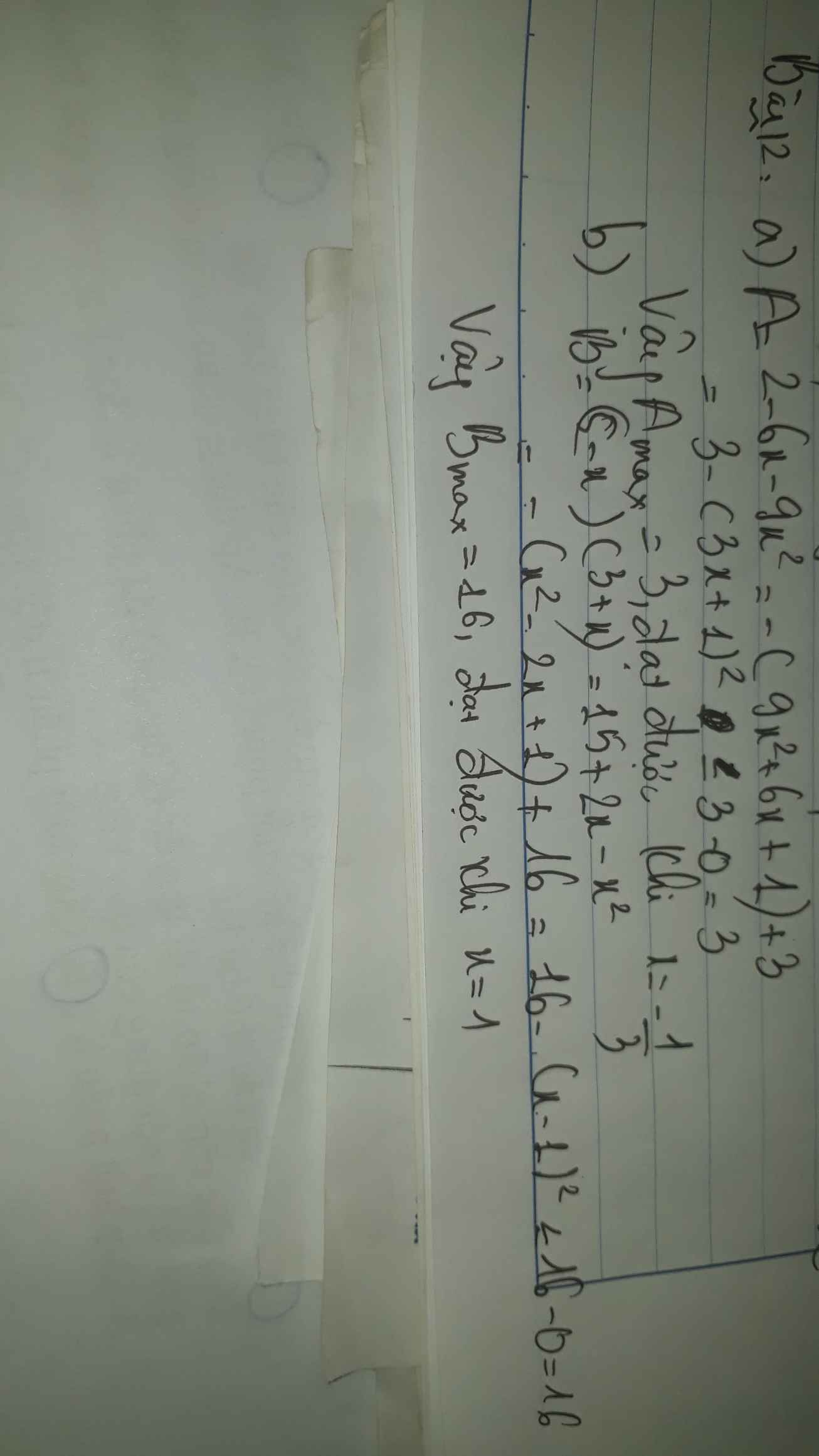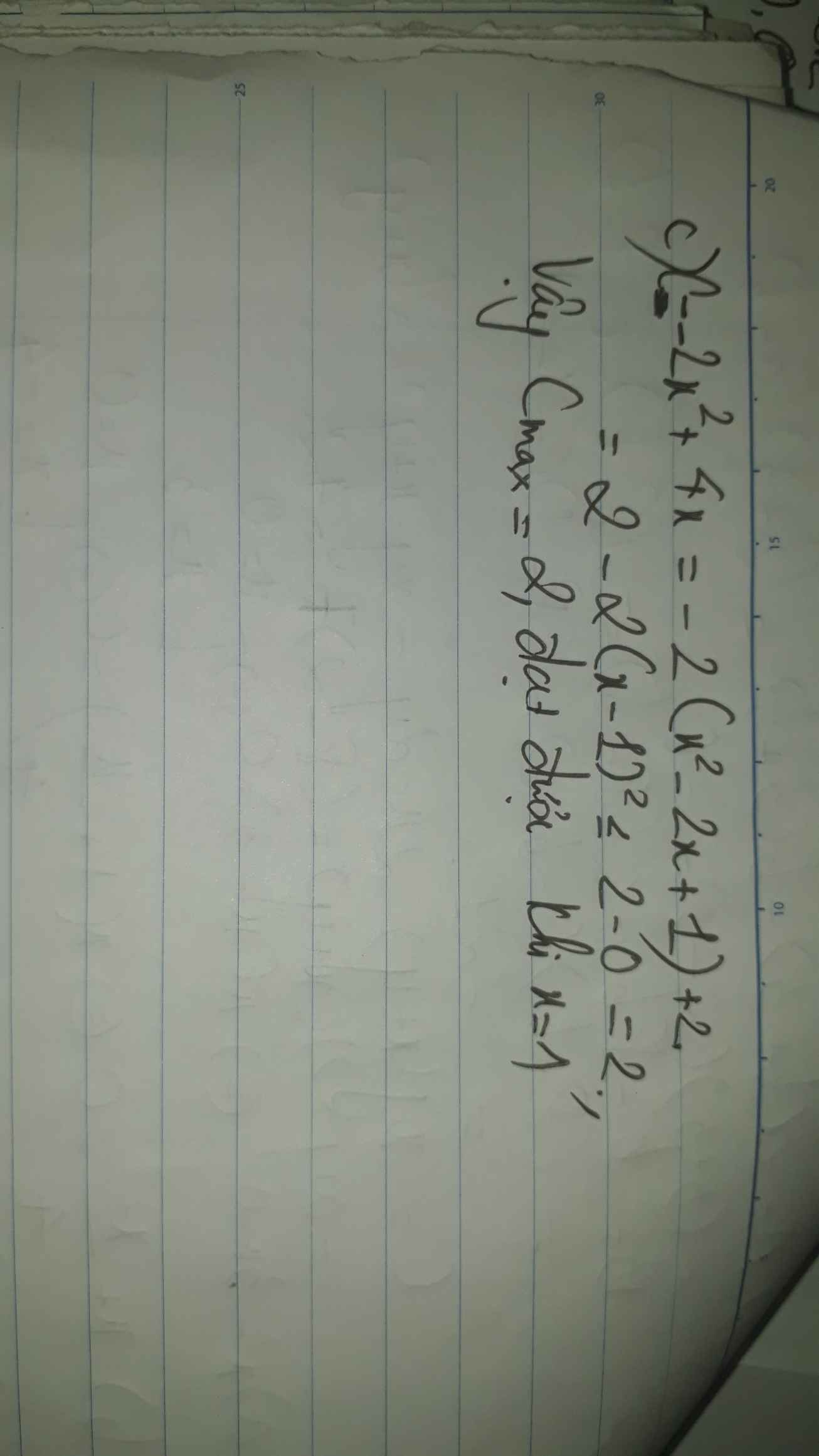
Hãy nhập câu hỏi của bạn vào đây, nếu là tài khoản VIP, bạn sẽ được ưu tiên trả lời.


Bài 1 :
a, \(A=x\left(x-6\right)+10\)
=x^2 - 6x + 10
=x^2 - 2.3x+9+1
=(x-3)^2 +1 >0 Với mọi x dương

D = \(-\dfrac{5}{x^2-4x+7}\)
Vì: x2 - 4x + 7
= x2 - 4x + 4 + 3
= (x - 2)2 + 3 \(\ge\) 3 \(\forall\)x
\(\Rightarrow\) \(\dfrac{5}{\left(x-2\right)^2+3}\) \(\le\) \(\dfrac{5}{3}\) \(\forall\)x
\(\Rightarrow\) \(-\dfrac{5}{\left(x-2\right)^2+3}\)\(\ge\)-\(\dfrac{5}{3}\) \(\forall\)x
Dấu"=" xảy ra khi:
x - 2 = 0
\(\Rightarrow\) x = 2
Vậy.............
E = \(\dfrac{2x^2+4x+4}{x^2+2x+4}\)
Ta có:
\(\dfrac{2x^2+4x+4}{x^2+2x+4}\)
= \(\dfrac{2\left(x^2+2x+4\right)-4}{x^2+2x+4}\)
= 2 - \(\dfrac{4}{x^2+2x+4}\)
Vì:
x2 + 2x + 4
= x2 + 2x + 1 + 3
= (x + 1)2 + 3 \(\ge\) 3 \(\forall\)x
\(\Rightarrow\) \(\dfrac{4}{\left(x+1\right)^2+3}\) \(\le\) \(\dfrac{4}{3}\) \(\forall\)x
\(\Rightarrow\) 2 - \(\dfrac{4}{\left(x+1\right)^2+3}\) \(\le\) \(\dfrac{2}{3}\) \(\forall\)x
Dấu "=" xảy ra khi:
x + 1 = 0
\(\Rightarrow\) x = -1
Vậy...............
F = \(\dfrac{6x+8}{x^2+1}\)
= \(\dfrac{x^2+6x+9-x^2-1}{x^2+1}\)
= \(\dfrac{\left(x+3\right)^2-\left(x^2+1\right)}{x^2+1}\)
= \(\dfrac{\left(x+3\right)^2}{x^2+1}-1\) \(\ge\) -1 \(\forall\)x
Dấu "=" xảy ra khi:
(x + 3)2 = 0
\(\Rightarrow\) x + 3 = 0
\(\Rightarrow\) x = -3
Vậy.....................

Ta có : P = 4x(x - 1) + 11
= 4x2 - 4x + 11
= (2x)2 - 4x + 1 + 10
= (2x - 1)2 + 10
Mà (2x - 1)2 \(\ge0\forall x\)
Nên (2x - 1)2 + 10 \(\ge10\forall x\)
Vậy GTNN của biểu thức là 10 khi và chỉ khi x = \(\frac{1}{2}\)

a,\(A=x^2-x-1\)
\(=x^2-x+\frac{1}{4}-\frac{5}{4}\)
\(=\left(x-\frac{1}{2}\right)^2-\frac{5}{4}\)
Vì:\(\left(x-\frac{1}{2}\right)^2\ge0\forall x\)
\(\Rightarrow\left(x-\frac{1}{2}\right)^2-\frac{5}{4}\ge-\frac{5}{4}\forall x\)
Hay:\(A\ge0\forall x\)
Dấu = xảy ra khi:\(\left(x-\frac{1}{2}\right)^2=0\Rightarrow x=\frac{1}{2}\)
Vậy Min A=-5/4 tại x=1/2
Hai phần cn lại lm tg tự nha bn

a A=4x-x^2+3
=(x-2)^2-1
MIN A= -1 khi (x-2)^2=0
x-2=0
x=2
B=x-x^2
B=-x^2+x
-B=x^2-x
-B=(x-1/2)^2-1/4
B=-(x-1/2)^2+1/4
MAX B=1/4 khi -(x-1/2)^2=0
x-1/2=0
x=1/2
N=2x-2x^2-5
-N=2x^2-2x+5
-N=2(x^2-x+2)+1
-N=2{(x-1/2)^2+7/4}+1
-N=2(x-1/2)^2+7/2+1
-N=2(x-1/2)^2+9/2
N=-2(x-1/2)^2-9/2
MAX N=-9/2 khi -2(x-1/2)^2=0
x-1/2=0
x=1/2

\(A=2x^2-2x+9-2xy+y^2\)
\(\Leftrightarrow A=\left(x^2-2x+1\right)+\left(x^2-2xy+y^2\right)+8\)
\(\Leftrightarrow A=\left(x-1\right)^2+\left(x-y\right)^2+8\)
Vì \(\hept{\begin{cases}\left(x-1\right)^2\ge0\forall x\\\left(x-y\right)^2\ge0\forall x;y\end{cases}}\)=> \(A=\left(x-1\right)^2+\left(x-y\right)^2+8\ge8\)
Dấu "=" xảy ra <=> \(\orbr{\begin{cases}\left(x-1\right)^2=0\\\left(x-y\right)^2=0\end{cases}}\)<=>\(\orbr{\begin{cases}x=1\\x-y=0\end{cases}}\Leftrightarrow x=y=1\)
Vậy MinA = 8 <=> x = y = 1

Ta có :
\(4x\left(x-1\right)-3\left(x^2-5\right)-x^2=\left(x-3\right)-\left(x+4\right)\)
\(\Leftrightarrow\)\(4x^2-4x-3x^2+15=x-3-x-4\)
\(\Leftrightarrow\)\(x^2-4x+15=-7\)
\(\Leftrightarrow\)\(\left(x^2-2.x.2+2^2\right)+11=-7\)
\(\Leftrightarrow\)\(\left(x-2\right)^2=-18\)
Mà \(\left(x-2\right)^2\ge0\) \(\left(\forall x\inℝ\right)\)
\(\Rightarrow\)\(x\in\left\{\varnothing\right\}\)
Vậy không có giá trị nào của x thoã mãn đề bài
Chúc bạn học tốt ~



mode 7 rùi nhập hàm số trên vào ra kết quả = sấp sỉ 5 nha bn